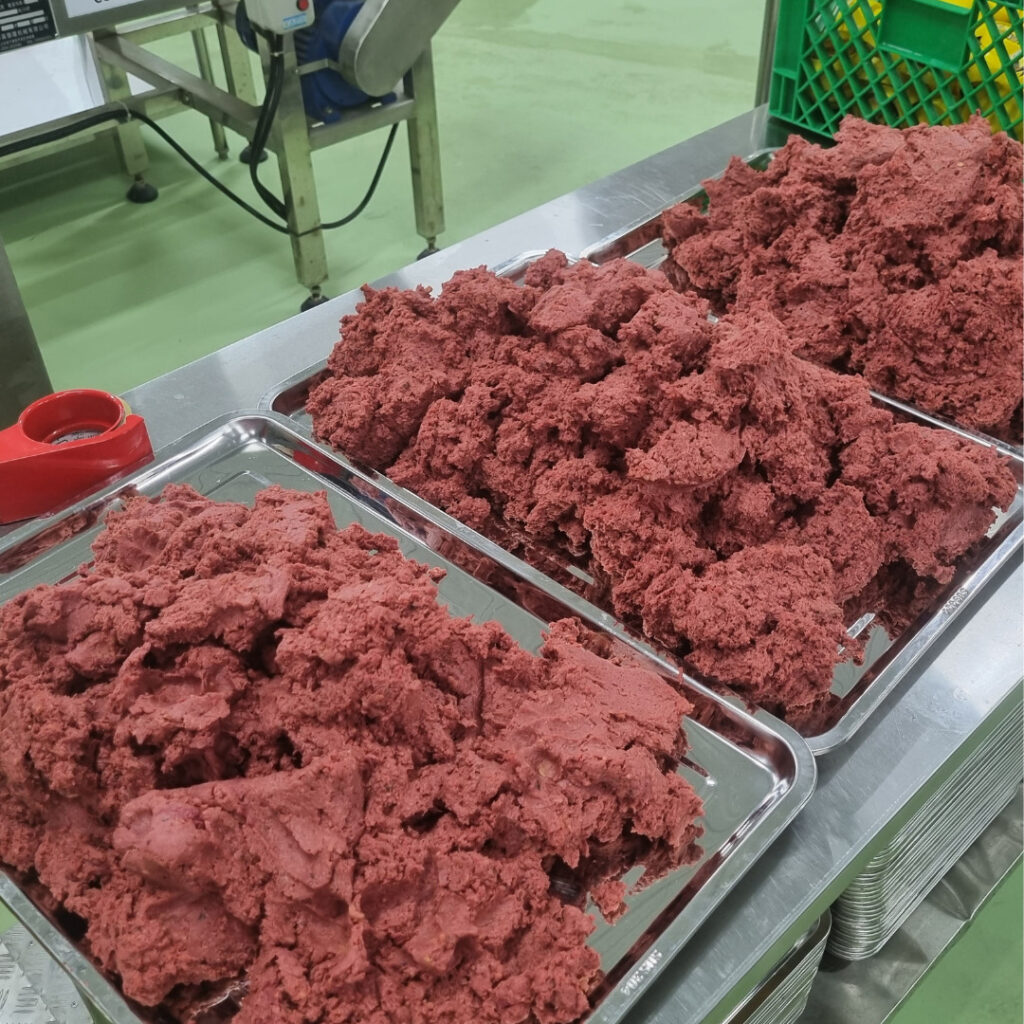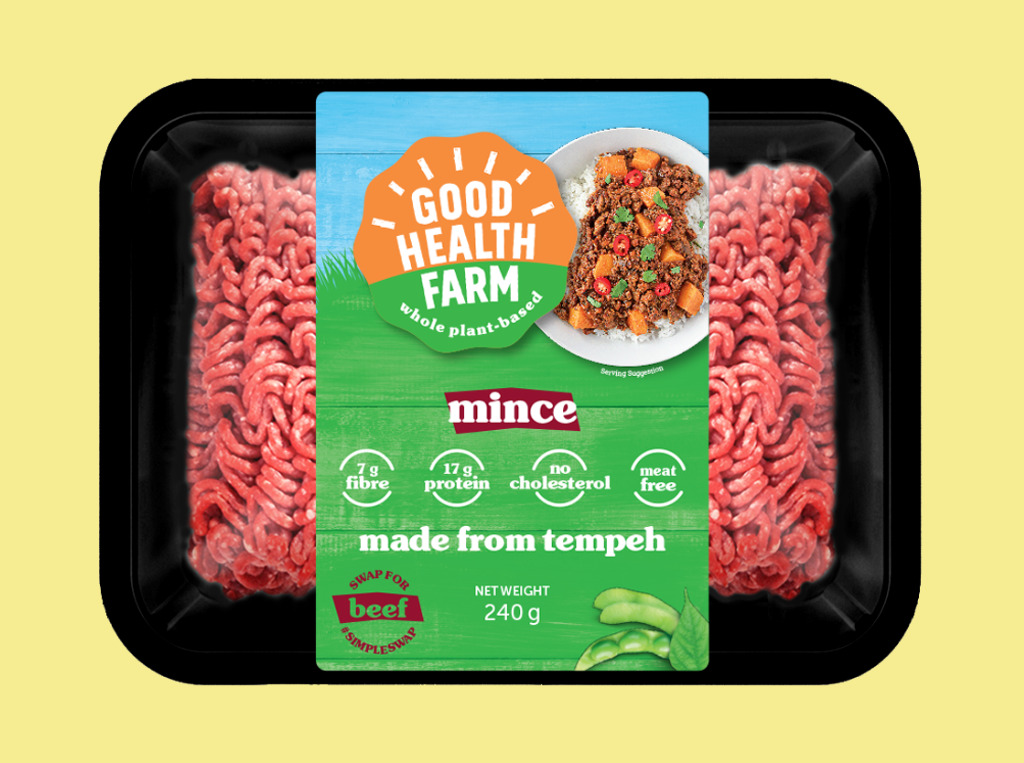4 Mins Read
Malaysian alt-protein startup Good Health Farm claims it has created the world’s first tempeh beef mince in Singapore. It looks, cooks and tastes like its conventional animal counterpart, and costs the same as certain premium varieties. The brand has also collaborated with Singaporean chef Forest Leong on a range of ready-to-heat local favourites made with its tempeh meat.
Founded in 2021 by a group of six entrepreneurs from Singapore, Malaysia and Australia who together have decades of experience growing food brands across Asia, the company says it is currently self-funded but told Green Queen it plans to open a seed funding round in September.
Good Health told Green Queen it is banking on a ‘cleaner’ label strategy – a global consumer survey by Ingredion last year revealed that more than half of consumers find it important for products to have a short ingredient list.
Good Health Farm’s plant-based mince contains a base of tempeh, textured soy protein and shiitake mushrooms, with vegetable oil, isolated soy protein, an unspecified thickener, flavourings, beetroot powder, soy sauce and sugar on top of that. That’s 11 ingredients – which if you are counting is nearly half of the ingredients in Impossible Foods’s beef mince, the market leader in Singapore.
The startup uses what it describes as “proprietary techniques and simple processing” to turn tempeh into plant-based mince and claims to be the first company globally to do so. Co-founder Andrew Fairlam told Green Queen that this manufacturing method offers the disruptive benefit of low-CapEx scaling, slashing the required investment to achieve mainstream production levels, and offering a viable and simpler alternative to the high-moisture extrusion that has become the norm for most plant-based meat brands.
Catering to the demand for locally produced food

When asked about customer feedback, the company says it tested its tempeh beef via a six-month foodservice trial in Kuala Lumpur. “Overall, we had great feedback from chefs and diners,” co-founder Fairlam tells Green Queen. “But it also gave us the opportunity to listen to negative feedback and make improvements prior to our retail launch in Singapore.
Good Health Farm’s partnership with Leong led to the company creating whole-food plant-based Asian cuisine meals like Mapo Tofu, Thai Basil Mince and Rendang Meatballs, which can be heated in five minutes, a key consideration for time-strapped professionals and parents looking for tasty, convenient dinner solutions. In a recent report, consulting firm Oliver Wyman wrote that “across the world, customers are seeking higher-quality food without having to prepare it themselves from scratch. This has contributed to the popularity of ready-meal takeaways and quick delivery, for which consumers have demonstrated a willingness to pay a premium.”
Fairlam says the brand is already working on more products: “We want to make it easy for more Asian consumers to swap to a plant-based diet, so we are working on some exciting product launches in the near future, which will include other meat types.”
Using a local food ingredient in tempeh, which is rooted in Indonesian food culture, is a savvy move in times when sustainability is top of mind for consumers. In fact, three in five people globally say they prefer purchasing food produced in their own country. This could be a marker for Good Health Farm – whose tempeh is sourced from local makers near its Ipoh, Malaysia base – to launch into Malaysia in the near future as well.
Tapping an opportunity in a tough market

The tempeh market itself isn’t as big as other vegan protein sectors. One estimate values tempeh at $4.2B globally, while the same analysis firm puts the plant-based meat market at over $49B. And while brands like UK-based Better Nature have showcased tempeh to a more global audience, tempeh hasn’t broken into the mainstream outside of Southeast Asia just yet.
The flavour factor may account for part of this. Tempeh is a fermented food that’s compressed into dense, chewy cakes filled with whole soybeans. Not everyone’s a fan of its strong, earthy flavour, but repurposing it into a more familiar flavour and texture – beef mince – could help Good Health Farm capture additional market share in the Asian market and beyond.
One thing the company has in its favor is the mince’s price point. At S$6.99 ($5.15) for each 240g pack, Fairlam promises that the brand’s tempeh beef is at par with premium beef in Singapore. It’s also nearly half the price of Impossible’s mince, and over a dollar cheaper than Quorn’s mince. In today’s high-inflation times, when consumers are facing ever-rising food prices, Good Health’s products could prove attractive.
Good Health Farm’s launch, which starts at online supermarkets Redmart and Lazada tomorrow, comes a week after a report found that alt-proteins must make up 50% of Asia’s total protein production by 2060 if the region is to decarbonise. “Our whole plant-based mince can appeal to mainstream shoppers across the region by making it easy for them to switch, and appealing to their core purchase drivers of taste, health and environment,” says Fairlam.
Echoing this sentiment, co-founder Yuen Ching Mok adds: “We believe our solution overcomes key barriers to the mainstream adoption of alt-protein across Asia, including naturalness, nutrition, great taste and affordable prices.”




